
The symptoms of head injuries may take weeks to emerge, and head injuries can lead to permanent disability. However, the symptoms of most mild head injuries will resolve within two weeks.
Two common causes of head injuries are car accidents and slip and fall accidents. If you’ve suffered a head injury after an accident that wasn’t your fault, such as a car accident or slip and fall accident, you may be eligible for financial compensation, likely from an insurance company.
However, because it can take weeks to realize you have a head injury, it is important that you seek medical attention immediately after an auto accident or hitting your head after slipping and falling. Insurance companies can claim your head injury was caused by something other than your accident and refuse to pay your medical bills if you wait too long to seek medical attention.
You will need a personal injury lawyer if the accident that caused your head injury wasn’t your fault. Insurance companies will not pay you what you deserve if you don’t have a lawyer.
You Need Experienced Brain Injury Lawyers if Your Brain Injury Wasn’t Your Fault
If the accident which caused your brain injury wasn’t your fault, it may have been the result of somebody’s negligence. Negligence is failing to be reasonably careful to prevent harm. Acting and failing to act can both be negligent. It is negligent to not behave as a reasonably careful person would behave in the same situation.
California law allows brain injury victims to recover financial compensation from negligent parties in a brain injury claim or brain injury lawsuit. The thing is, the source of financial compensation in brain injury cases is almost always an insurance company, and insurance companies won’t pay you what you deserve for your injuries if you don’t have a lawyer.
Insurance companies’ main priority is to preserve their own profit margin. Thus, if they don’t have to pay you what you deserve, they won’t. They can and will just offer you a tiny fraction of what you really deserve and dare you to sue them over it. And they can do this because they have a lot of money to hire expensive lawyers, so they know you can’t win in court against them without a lawyer of your own.
If you have experienced, expert brain injury lawyers like Nadrich Accident Injury Lawyers representing you, however, it is likely that the insurance company will offer you what you are entitled to under California law for your injuries in an out-of-court settlement. This is because insurance companies know that we have a long, consistent track record of success in representing brain injury victims, so they know that it’s a waste of their time and money to take us on in court.
In addition, insurance companies are very good at tricking injury victims into saying things they can use to avoid paying them. Insurance adjusters are trained to manipulate you into saying things that imply your accident was your fault or that your injuries aren’t as severe as you say they are. For this reason, it’s critical that you have experienced brain injury attorneys like Nadrich Accident Injury Lawyers by your side so they can handle all communications with insurance companies for you.
Financial Compensation Available After a Head Injury
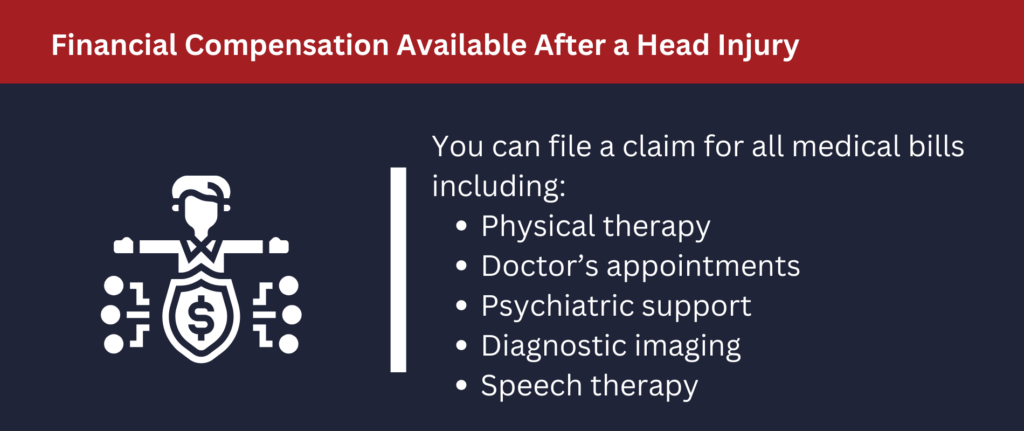
If you suffered a head injury due to someone else’s negligence, you are allowed to file a claim for compensatory damages against the responsible party. These damages include losses that can be objectively verified (economic damages) and losses that are subjectively valued (non-economic damages).
Those who suffer brain injuries frequently need long-term, extensive medical care. Because of this, the damages awarded in brain injury cases are often very substantial. You can file a claim for all medical bills including:
- Physical therapy
- Doctor’s appointments
- Psychiatric support
- Diagnostic imaging
- Speech therapy
A brain injury claim may also include compensation for home modifications, loss of earning capacity, lost wages, or non-medical needs, like driving or cooking.
Examples of non-economic damages include loss of consortium, pain and suffering, humiliation, injury to your reputation, emotional distress, and loss of society and companionship. You may qualify to be compensated for non-economic damages if:
- You suffered severe pain because of your head injury
- You suffered shock, shame, grief, or mental anguish
- Your head injury caused permanent effects or disability, such as paralysis or blindness
- Your head injury impacted your ability to provide moral support to or be intimate with your spouse or partner
You may also be able to recover punitive damages if the negligent party acted with fraud, oppression, or malice. For example, punitive damages may be awarded if your head injury was caused by a drunk driver, someone trying to get away from the cops, or someone behaving in a reckless or criminal manner.
Common Causes of Brain Injuries
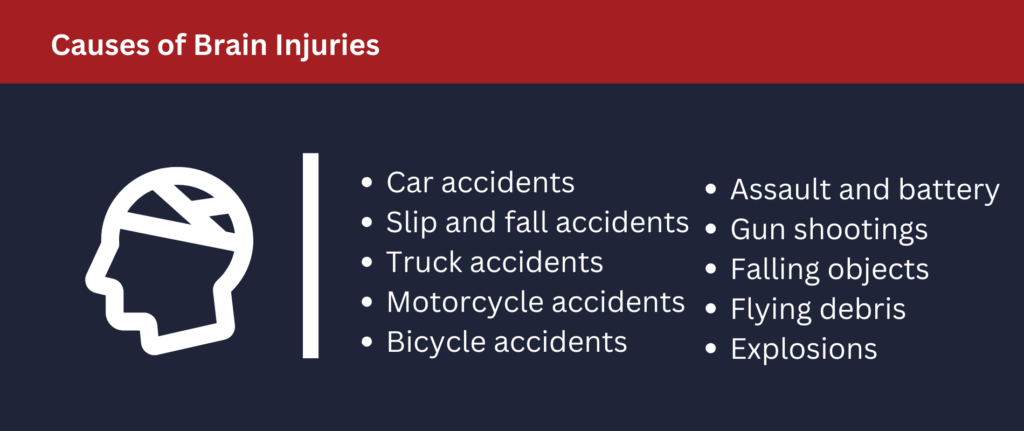
Common causes of brain injuries include:
- Car accidents
- Slip and fall accidents
- Truck accidents
- Motorcycle accidents
- Bicycle accidents
- Assault and battery
- Violent crimes
- Gun shootings
- Falling objects
- Flying debris
- Explosions
About 600,000 brain injuries occur every year because of falls, and about 300,000 brain injuries per year occur because of auto accidents.
Collisions and impacts cause injuries via “diffuse axonal shearing,” where an impact’s force leads to the brain moving inside the skull and bouncing off the skull. This can cause brain nerves and spinal cells to shear, leading to the death of neurons. An impact can cause secondary effects which can further damage the brain, such as oxygen deprivation, swelling, or hemorrhaging.
No Recovery Obtained, No Fee Charged
We are contingency fee lawyers. This means that you will never owe us any money out of pocket for us to represent you.
We don’t charge a fee unless and until we obtain financial compensation for you. The only fee we charge is a percentage of any recovery we obtain.
Call us or contact us online today for a free consultation if you or a loved one suffered a head injury in an accident that was somebody else’s fault. You may be entitled to compensation. The experienced traumatic brain injury lawyers at Nadrich Accident Injury Lawyers can represent you on a contingency fee basis, so you will never owe even a penny out of your own pocket for quality representation.
Frequently Asked Questions
Head injury symptoms may not emerge for weeks. Head injuries can cause permanent disability. Most mild head injuries, however, will see their symptoms resolve within 14 days.
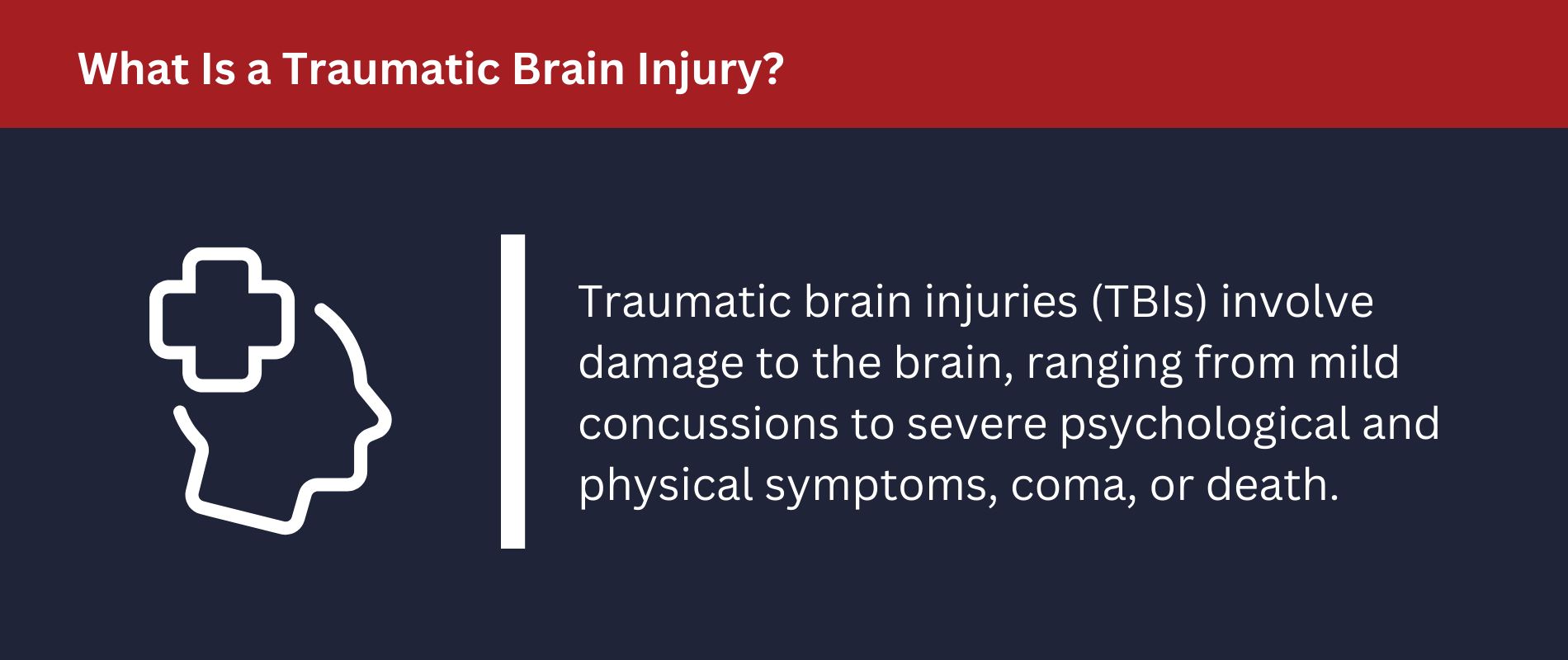
A traumatic brain injury (TBI) is an injury that damages the brain. Jolts, bumps, or blows to the head can cause TBIs known as closed head injuries. When objects penetrate the skull, this can cause TBIs known as penetrating injuries.
TBI symptoms can range from mild to severe. An example of a mild TBI is a concussion. Concussion symptoms can be severe, but people typically fully recover from concussions. More serious TBIs can cause serious psychological and physical symptoms, coma, or death.
A concussion is a TBI caused by a jolt, blow, or bump to the head that leads to the brain moving quickly back and forth, which can cause the brain to twist or bounce around in the skull.
Symptoms that people with concussions notice include:
• A headache, or “pressure” in your head
• Dizziness
• Balance issues
• Double vision
• Blurry vision
• Sensitivity to noise or light
• Feeling groggy, foggy, hazy, or sluggish
• Memory problems
• Concentration problems
• Confusion
You should seek medical attention if you think you might have a concussion.
You should seek medical treatment as soon as you can if you have a concussion. In the first two days after you have a concussion, you should do the following:
• Rest
• Sleep at least 8 to 10 hours every day
• Avoid caffeine
• Avoid screen time on tablets, smartphones, TVs, or computers
• Make sure someone checks on you to ensure your symptoms aren’t getting worse
• Avoid loud noises and bright lights
• Avoid activities that are mentally demanding, such as reading, computer use, school, or work
• Avoid demanding physical activities such as sports
• Take a mild pain reliever such as Tylenol if you need it
• Eat a healthy, light diet
• Keep hydrated
• Avoid alcohol
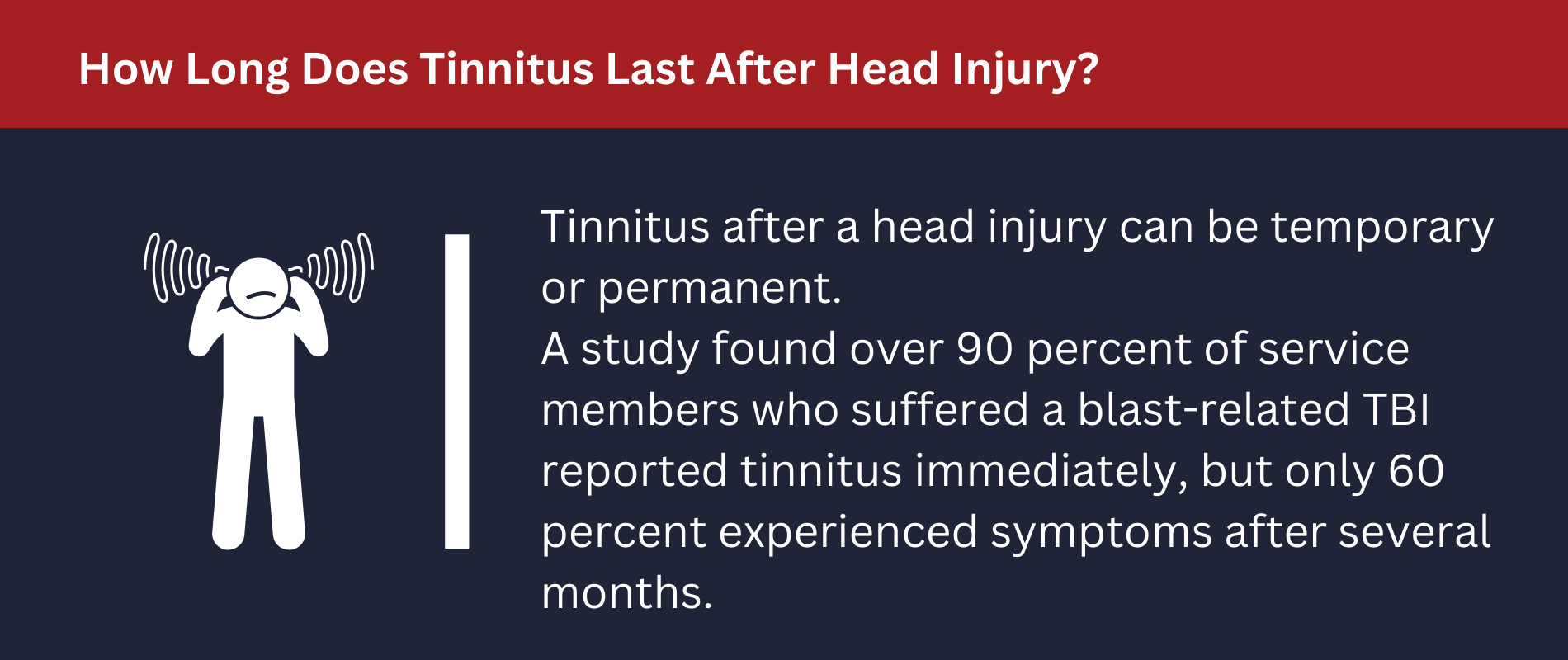
Tinnitus after a head injury can be temporary or permanent.
A 2011 study found that over 90 percent of service members who suffered a blast-related mild TBI reported tinnitus immediately after the injury. 70 percent reported tinnitus a week after the injury, and less than 33 percent reported tinnitus 17 days after the injury. Interestingly, over 60 percent reported tinnitus several months after the injury.
Most concussions are resolved within two weeks. The average concussion resolves after 10 days. Concussion symptoms, however, can persist for over a year.
You should get medical attention for any head injury before sleeping. However, it is a common myth that one shouldn’t sleep for 24 hours after a concussion. It is safe to sleep after a concussion once you have received medical attention for your head injury.
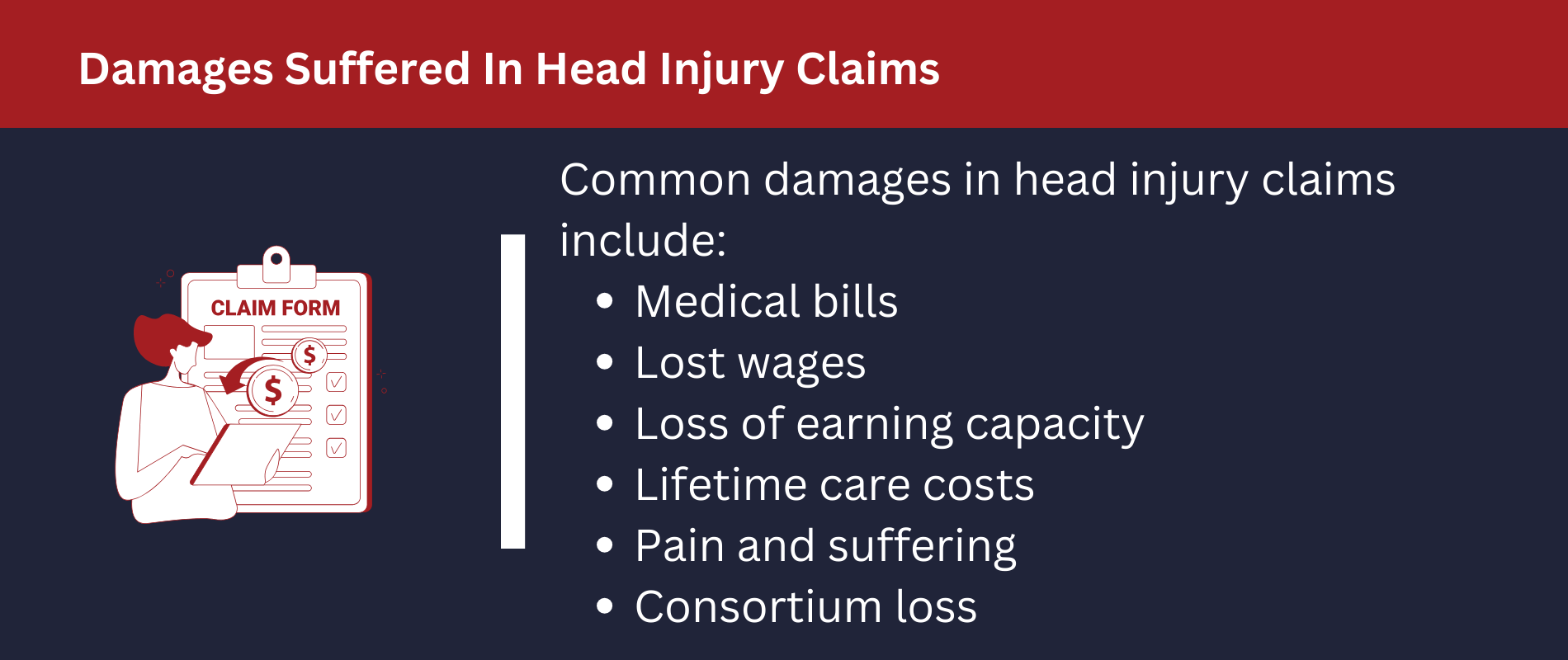
Each individual head injury claim will be worth a different amount of money, depending on multiple factors.
The value of a head injury claim is based on the damages suffered. Examples of damages suffered in head injury claims include:
• Past and future medical bills
• Loss of wages
• Loss of future earning capacity
• Pain and suffering
• The cost of lifetime care
• The loss of enjoyment of life
• Loss of consortium (loss of companionship)
Call us today for a free consultation if you’d like to learn more about what your head injury claim may be worth. Our experienced brain injury lawyers can tell you what damages you may be eligible to recover and provide an accurate estimate as to how much your claim may be worth.
You should call 911 whenever you suffer a head injury involving skin discoloration, vomiting, confusion, loss of consciousness, seizure, a persistent headache, slurred speech, numbness, or a loss of coordination.
If you get in a car crash or hit your head in an accident, you should seek medical attention as quickly as possible if you don’t call 911 immediately. This is so that insurance companies can’t claim something other than your accident caused your head to be injured. Failure to seek medical attention for a possible head injury in time can prevent you from obtaining financial compensation from insurance companies.
Closed head injuries are TBIs that do not involve skull breakage. The brain moves forward and backward rapidly and shakes inside the skull, leading to tearing and bruising of blood vessels and brain tissue. Common causes of closed head injuries include car accidents, sports, and falls.
Research is inconclusive as to whether alcohol can impair recovery from a mild TBI in humans, although it appears alcohol impairs mild TBI recovery in animal studies. So, it may be a good idea to abstain from alcohol until you have fully recovered from your TBI.
It is probably best to at least avoid alcohol during the first 24 to 48 hours after a head injury since alcohol could make it harder for doctors to tell if your injury is affecting you.
Drinking before you are fully recovered from your TBI may make you feel much worse. So, again, it may be a good idea to not drink until you are fully recovered.

